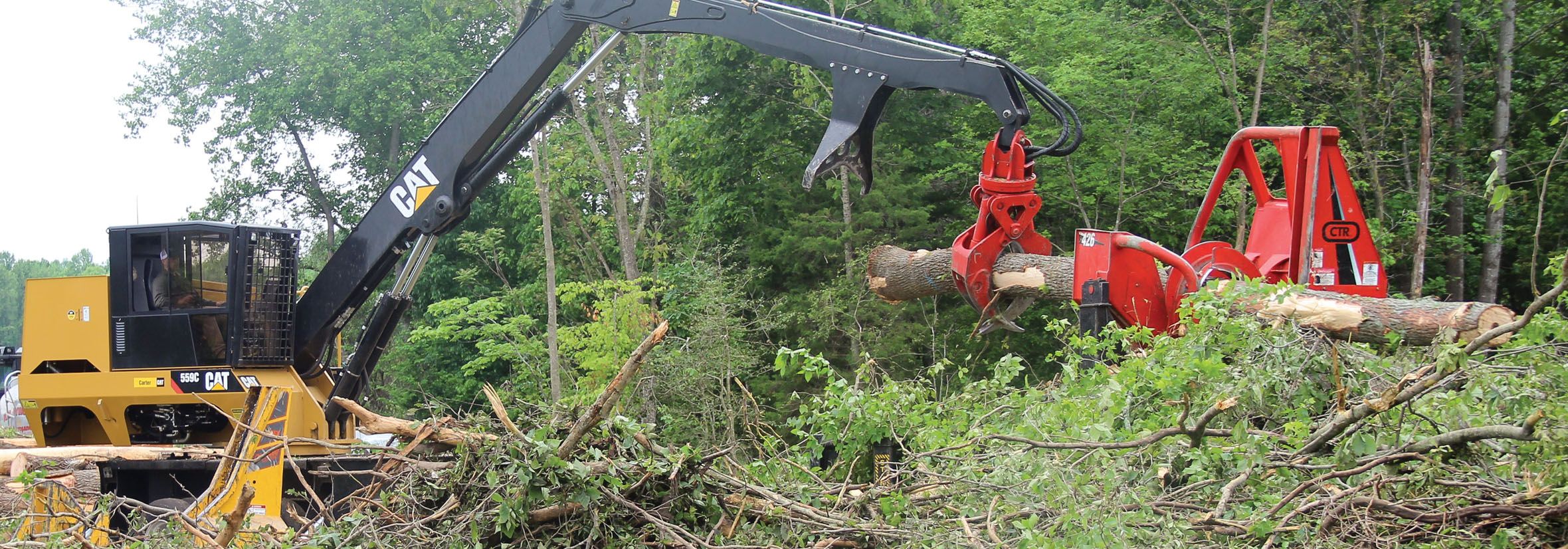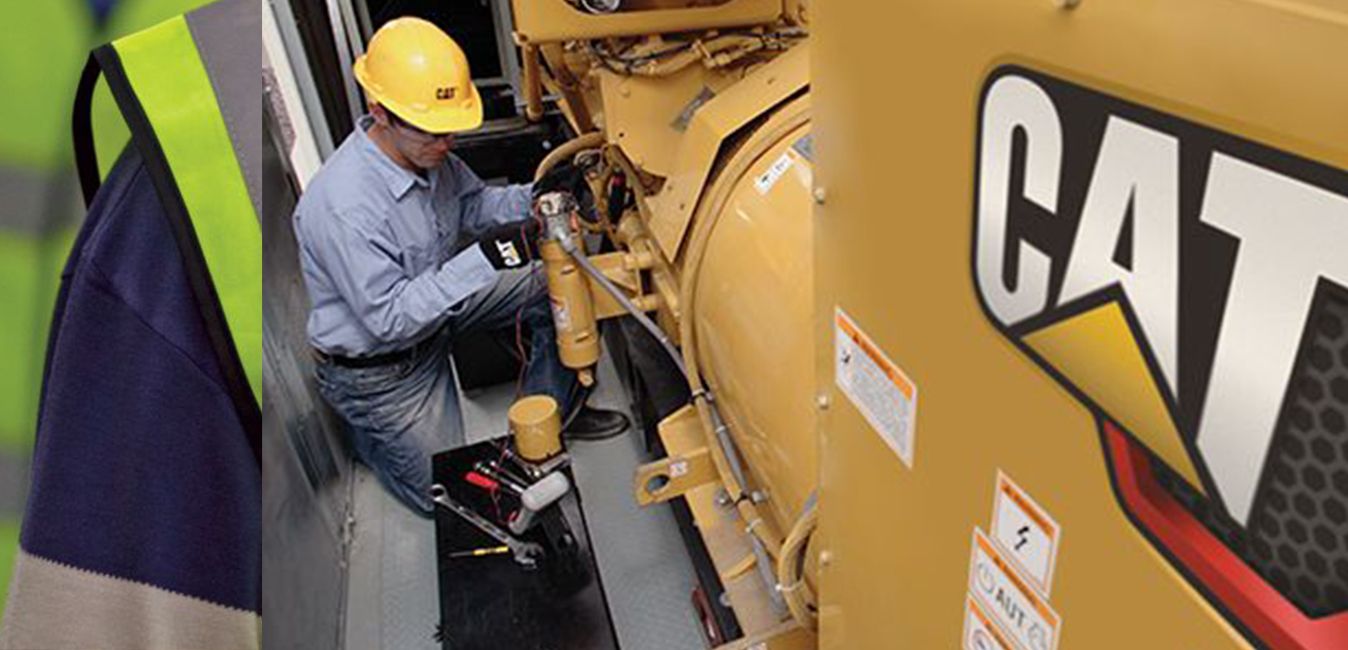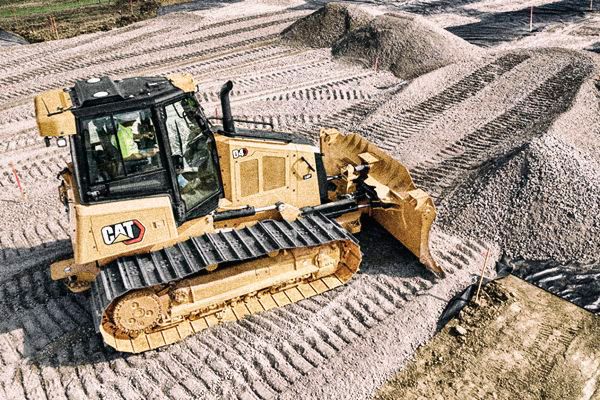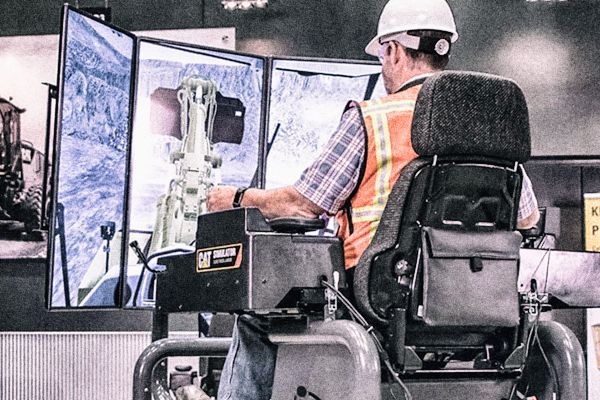Williams did private land-clearing jobs and right of work way work for power companies for three years. “It got to be a real competitive business with lots of people going in it, so prices started going down,” he relates. “My intention with mulching was to get into the logging side.” The transition was gradual. “The amount of money to get in logging, it never seemed possible. As I started growing slowly through the clearing side, though, it started to seem attainable.” Over the next few years, the mulching/land-clearing company evolved into a dedicated, full-fledged logging crew.
That was four years ago when his childhood dream became a reality.
“All the pieces aligned themselves in the last seven years.”
Team
The crew sets up with two loaders, one feeding a chipper and loading trucks while the other merchandises logs. Kurt Dunn, who has been on the job for two years, oversees operations when Williams can’t be on-site. He runs the loader and does all the processing and much of the mechanical work. Brent Berngquist runs the other loader, the one that feeds the chipper.
Father and son team James Harvey, Sr. and James Harvey, Jr. drive the two skidders. James, Sr. also handles any manual felling when required, and both of them can fill in on the loader if Dunn needs to be out of the machine. Johnny Dunn, Kurt’s brother, mans the track feller buncher.
Company truck drivers are Kenny Baylor, Keith Neal and Chris Ferguson. Williams also hires a regular contract truck driver, Courtney Duncan. Another, Mike Stebbins, also sometimes sends some of his trucks if Williams needs some extra hauling capacity.
Williams has downsized the trucking side of his operation for the time being in response to higher trucking insurance rates. “It saves me money to have a few contract drivers I can depend on and to run my own for half the trucks I need.” Also, he has parked a few trucks for now because the operation is currently consolidated into one crew; on certain jobs, it splits into two.
Equipment
In-woods machinery is mostly from Caterpillar, including three Cat® 545 Skidders (2012-2013 models), 2016 Cat 559C Loader, and a 2016 model 521B Track Feller Buncher with Quadco head. He also has a D5K Dozer.
Williams’ investment stands at $3.5 million, or so it was “the last I looked,” he says with a grin. Carter Machinery in Richmond is the dealer for all his Cat machines.
As with many loggers, Williams’ brand loyalty comes down to a strong relationship with the equipment dealer. “Carter Machinery has stood behind me from the beginning and gone above and beyond anything you could ever hope for,” he says. “They are the reason this is possible for me; without them, this wouldn’t work. When my cutter breaks down at 5 o’clock, someone is out here that night making sure it is running the next morning.”
“CARTER MACHINERY HAS STOOD BEHIND ME FROM THE BEGINNING AND GONE ABOVE AND BEYOND ANYTHING YOU COULD EVER HOPE FOR. THEY ARE THE REASON THIS IS POSSIBLE FOR ME; WITHOUT THEM, THIS WOULDN’T WORK. WHEN MY CUTTER BREAKS DOWN AT 5 O’CLOCK, SOMEONE IS OUT HERE THAT NIGHT MAKING SURE IT IS RUNNING THE NEXT MORNING.”
When it comes to maintenance, the routine Williams settled upon was to service two machines every Friday. That rotation works out such that all the machines get oil changed once a month, or at 250-hour intervals. To track it, Dunn keeps a written logbook of service hours and any repairs for all machines and trucks.
When repairs have to be done in the field, Williams keeps a 45 ft. trailer that he has converted into a mobile shop on the job site. It is always fully stocked with spare parts and supplies.
Markets
With its operations based in Chester, about 15 miles south of Richmond, the company works primarily for John Rock, Inc. That company, which makes pallets, has two sawmills in Virginia to supply its pallet operations 200 miles away in Pennsylvania. One sawmill is in Caroline County, between Richmond and Fredericksburg, and the other is in Dillwyn, 60 miles west of Richmond. The sawmills operate under the name Rock Wood Products. The John Rock company chose this area because it is rich in hardwood.
“We supply all the stumpage for the Caroline mill,” Williams says. He estimates that 75% of what his crew cuts in a year is stumpage Rock Wood has bought. Aside from John Rock stumpage, Williams buys 25% of his own timber each year.
John Rock buys both pine and hardwood saw timber, and a lot of stands are mixed. Pulpwood is common, but Williams rarely hauls it as such. “We don’t do much pulpwood,” he says. “We separate logs and chip the rest. Tops and pulpwood both go in the chipper, unless there’s a problem at Enviva, then we will haul pulpwood.” He explains that consistency—every chip load can always be 32 tons—and higher productivity make this method more profitable than hauling pulpwood at current prices.
Of the 90 average loads his crew hauls weekly, Williams says about half are chips and half are logs. Logs go primarily to John Rock/Rock Wood in Sparta, Va. (Caroline County) and chips go to Enviva in Hopewell and some in Southampton. When he occasionally hauls some pulpwood he sends it to West Rock in West Point.
It’s nice working for a sawmill, he says, because there is no quota. Rock Wood is always wide open. He also credits the company for its proactive involvement in sustainable forestry. “They do a very good job by sending their forester, Daniel Jones, out to looks at each job to make sure the BMPs are done correctly. They really stress sustainable forestry to ensure the future. It’s cool to see a mill take the time to work with loggers to make sure it’s done correctly. They want to plan for a long future and so do we.”
Looking Ahead
As far as future plans go, Williams is already working on one of his: starting his own wood yard. The goal is to create a buffer against a logger’s oldest enemy: the weather. “Sometimes loggers can’t get in the woods for weeks in the winter. I want an inventory on the wood yard to sell in those times.” He has a space for it set up at his shop, with an extra loader, an older Cat 559B, in place. He plans to start building inventory this summer, and will eventually install a sprinkler system. His goal is to keep about 100 loads stored. “It’s like a piggy bank. Instead of missing two days of work when it’s too wet to get in the woods, you don’t really miss anything because you can keep trucks on the road moving wood.” In six months to a year, he says, he will start buying outside wood and other products as well.
Though he says the business is right at the size he wants it for now, he does hope to branch out into buying his own land over the next decade. “I want to manage and create something so that, when I do have kids, we will have a good size of land we can fall back on as another investment. I’d rather invest in trees than the stock market.”
Profit, he says, has been on par with investment last year, even after purchasing several new trucks and pieces of equipment in that time frame. A reasonable percentage to his way of thinking is 6-8%. “It is hard to hit that every year. There are so many variables you can’t control,” he admits. He references limitations due to weather and mill closures that can restrict production. “That’s the nature of the business.” Even so, his company has grown every year since it started. So far, he says, 2016 is on track to be one of his best years yet. “We are already sitting far above where we were this time last year.”
As far as hobbies, Williams, still a bachelor with no children, calls himself obsessed with duck hunting. “Unfortunately, this is getting bigger,” he laments, gesturing towards the job that embodies his childhood dream come to life. “So my time for hunting is more spaced out, but if it’s not duck season, we are out here working on something every day.”
(This article was modified from an article appearing in the July Issue of Southern Loggin’ Times.)















